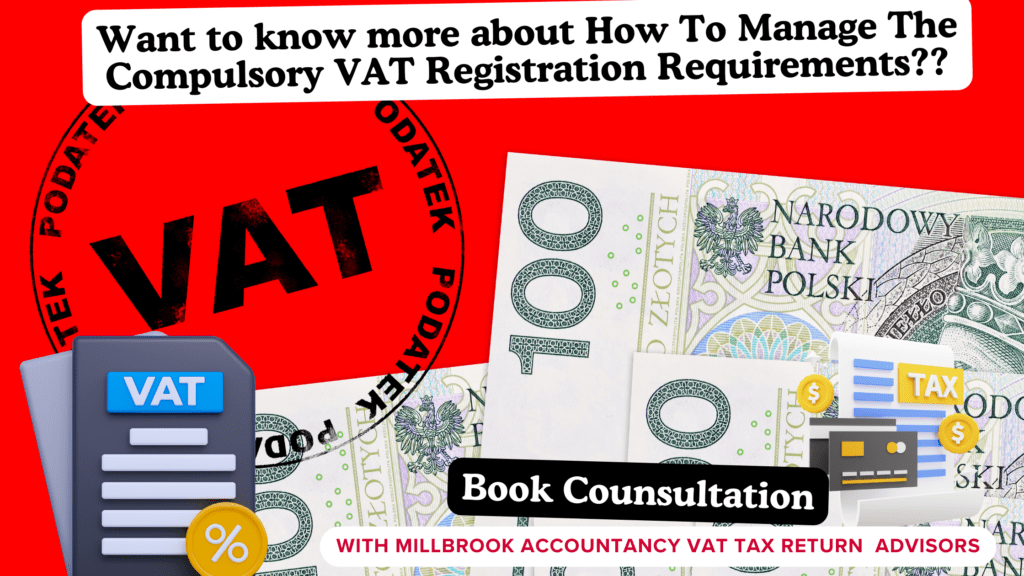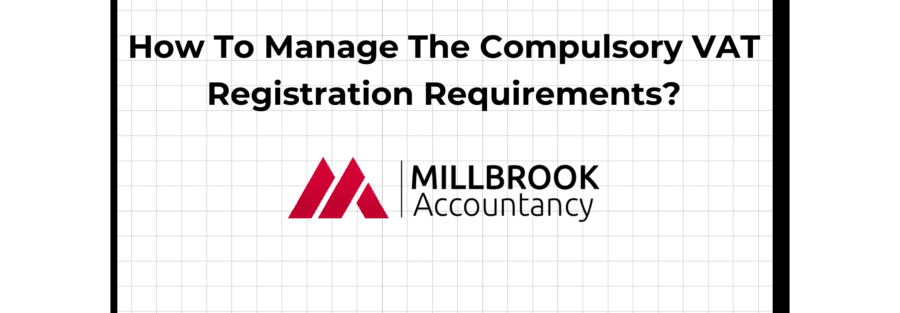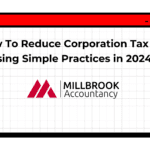VAT Registration Requirements
Many products and services sold in the United Kingdom and those imported from other European nations are subject to value-added tax, or VAT. Is there a way to manage temporarily over VAT threshold compulsory VAT registration?
Understanding the VAT Registration Threshold
This implies that if your company’s annual revenue is more than £85,000, you must register for Value Added Tax.
VAT Registration Requirements Conditions Requiring Registration
You must register if:
You have a VAT taxable turnover of more than £85,000 in the previous 12 months (the VAT threshold).
You foresee almost £85,000 in sales in the following 30 days.
Additionally, registration is required if you’re not local to the UK, have a company not headquartered in the UK, or sell anything to the UK.
Voluntary registration for VAT is available to businesses with an annual revenue of less than £85,000.
Process of Registration
From the date of your registration with HMRC, you are responsible for paying any VAT due to the government. You need not register for VAT if your sales fall within the VAT exemption category.
Anticipating Future Sales
If you expect your sales to exceed £85,000 in the next 30 days, there is a 30-day window in which you must register. You must register as of the day you realized, not the date your revenue exceeded the criteria.
Voluntary VAT Registration
This can be beneficial for companies dealing with other VAT-registered firms or those seeking refunds from HMRC.


Who Is Not Eligible for a VAT Number?
You can only register for VAT if your organization qualifies as a business under HMRC’s definition. If your company primarily deals in VAT-exempt products or services, you are not eligible to register.
VAT Registration Threshold for 2023/24
For the fiscal year 2023/24, the UK VAT threshold is £85,000. Determining whether your company has to file a VAT registration is crucial in deciding whether or not to register for value-added tax.
Calculating VAT Threshold
Calculate your taxable income, verify your products’ or services’ VAT rate, and don’t count exempt purchases. Include sales figures from the past year if applicable.
Who Needs to Register for VAT?
A company must register for VAT if its taxable sales for a rolling 12-month period are expected to be higher than the VAT registration level. Another scenario is if it acquires another company already registered for VAT.
Deregistration for VAT
If the VAT taxable turnover of your firm exceeds £85,000, you must register with HMRC. You can request HMRC to revoke your VAT registration if your company’s VAT taxable revenue drops below £83,000.
Strategies to Manage Compulsory VAT Registration
Businesses employ various strategies:
Encourage major material purchases.
Force sales reduction by closing shop for a few days.
Consider one-off projects that do not count toward registration.
Considerations When Not Registering
If doing one-off projects, determine if they are business-related. If income has been declared business-related, try convincing HMRC of an expected decline in future taxable turnover.
VAT Rates for 2023
Standard Rate – 20%
Reduced Rate – 5%
Zero Rate – 0%
VAT Exemption Goods
VAT exemption applies to certain goods and services, including land, insurance, postal service, literacy and learning, finance, welfare and health, investing in gold, sport, gaming, culture, and charity auctions and dinners.
How Can an Accountant Add Value?
An accountant can help unlock the potential of your business by accurately handling VAT liabilities and advising on efficient VAT processes.
Conclusion VAT Registration Requirements
If your business’s taxable revenue exceeded £85,000 in the previous 12 months, you must register for Value Added Tax. Consider the mentioned situations where you might not have to register. Seek the counsel of a qualified accountant before implementing any VAT-related procedures.
sider the mentioned situations where you might not have to register. Seek the counsel of a qualified accountant before implementing any VAT-related procedures. This article is informational; all information should be followed after seeking suitable advice.
Frequently Asked Questions (FAQs)About VAT Registration Requirements
- What does “temporarily over VAT threshold” mean?
The term “temporarily over VAT threshold” refers to a situation where a business’s taxable turnover exceeds the VAT registration threshold for a brief period, triggering the need for compulsory VAT registration.
- How can I find the VAT threshold for my business in 2023/2024?
For the fiscal year 2023/24, the VAT threshold in the UK is £85,000. If your business’s taxable turnover surpasses this amount, you must register for VAT.
- What are theVAT Registration Requirements?
To register for VAT, your business must meet specific criteria, including having a VAT taxable turnover exceeding £85,000 in the previous 12 months or foreseeing almost £85,000 in sales in the next 30 days. Other conditions also apply.
- Can I voluntarily register for VAT even if my turnover is below the threshold?
Yes, voluntary VAT registration is available for businesses with an annual revenue below £85,000. Some businesses choose voluntary registration for various reasons, such as dealing with other VAT-registered firms.
- What are the rules and VAT Registration Requirements?
VAT registration rules include meeting the threshold criteria, maintaining accurate records, and submitting VAT returns on time. Understanding these rules is crucial to comply with HMRC regulations.
- Is there a way to avoid mandatory VAT registration?
Avoiding mandatory VAT registration is challenging if your business meets the threshold criteria. However, certain strategies, such as careful financial planning and understanding the rules, can help manage the process effectively.
- Can I have two businesses to avoid VAT?
Having two businesses to avoid VAT is not a straightforward solution. HMRC has regulations in place to prevent abuse of the system, and attempting to exploit loopholes may lead to legal consequences.
- What is the process of becoming VAT registered?
The process of becoming VAT registered involves submitting an online application to HMRC. This includes providing essential business information, details about your taxable turnover, and other relevant documentation.
- How can I temporarily avoid VAT while still operating my business?
Avoiding VAT temporarily may not be a viable long-term strategy. However, businesses can explore legal options such as one-off project considerations, forced sales reduction, or encouraging major material purchases to manage VAT implications.
- What are the consequences of late VAT registration?
Late VAT registration can result in penalties and interest charges. It is crucial to register on time to fulfill your obligations and avoid financial repercussions imposed by HMRC.
These FAQs provide insights into key aspects related to VAT, registration requirements, and strategies to manage VAT implications for businesses.
if you are Not Registered for VAT? Guide to Avoid Penalties must explore
If you need counsultation how to register for vat our experts are ready to help you get free consultation now
must explore our other services





